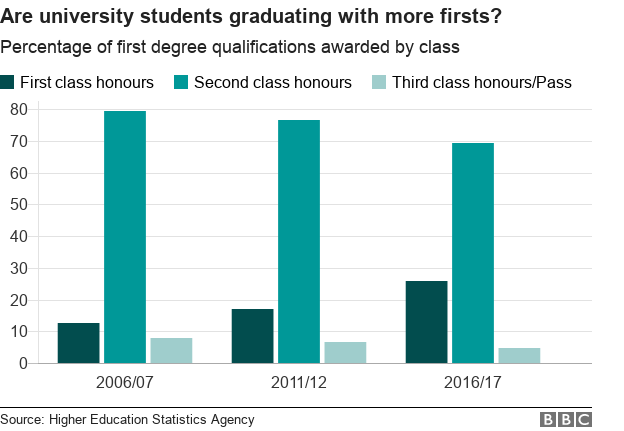Too many firsts risk universities' credibility, says think tank
- Published
- comments

Universities risk losing their credibility due to "rocketing" grade inflation, a think tank has said.
According to Reform, the proportion of firsts awarded almost doubled between 1997-2009 and rose by 26% since 2010.
Their report calls for national tests to set degree grade benchmarks meaning only the top 10% of students could be awarded firsts.
Education Secretary Damian Hinds said universities needed to act to protect the value of degrees.
Under Reform's proposals, universities would lose their ability to decide what their students should be awarded.
University leaders have argued a standardised approach would threaten their independence.

Grade inflation?
The centre-right think-tank Reform argues that more and more students are being awarded top grades.
Its report says:
Last year more than 40% of students at the University of Surrey graduated with a first class degree.
Since 1995 the proportion of 2:1 degrees rose from 40% to 49%
75% of students achieve one of the top two classifications, compared with 47% in the mid-1990s
In more than 50 universities the proportion of first class degrees has doubled since 2010

Universities currently make their own decisions about grades and the report suggested pressure placed on academics by senior managers could partly explain why more top degrees are being awarded.
The report also said "degree algorithms" which translate the student's marks into their final grade classification were to blame.

Under Reform's proposals final-year students would sit new, national assessments set by a "designated assessment body".
The results from the assessments would determine how many students should be awarded a particular grade.
The top 10% of students would receive a first, the next 40% a 2:1, and the 40% after that a 2:2. The bottom 10% would get a third.

Report author Tom Richmond and former adviser to education secretary Michael Gove, said: "Rocketing degree grade inflation is in no one's interest.
"Universities may think easier degrees are a way to attract students, but eventually they will lose currency and students will go elsewhere, even overseas.
"Restoring the currency of degrees would also mean better value for money for the £18 billion that universities receive each year in tuition fees," he added.
Education Secretary Damian Hinds said: "Students across the country work hard for their results and they deserve grading system that recognises their hard work.
"That is why this government has put an end to grade inflation in GCSEs and A-levels, and why it is time for universities to do the same."
- Published24 May 2018

- Published8 July 2017